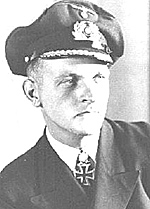
“It is, in short, a special way of life, so it is not surprising at all that all submariners have developed a special spirit, which may be surmised in the words ‘teamwork’ and ‘solidarity’. This is true in the submarine branch of any navy, but perhaps it was particularly so in the U-Boats of World War II. During their patrols, in a time of increasing physical and psychological insecurity, the personnel were asked to become a ‘Band of Brothers’. In such a group, human relations can be so strong that they go beyond the natural instinct for self-preservation.
Apart from this general concept of leadership, there was a special German situation in the last war.
In 1943, the graphical plot of ships sunk fell drastically, and the construction of new ships in the United States was multiplying. At the same time, the loss of submarines was increasing. For every three boats leaving for wartime patrol, only one returned. In this situation, the internal stress on a commanding officer was extreme. With reduced successes and increasing losses, the life of each crewmember was visibly endangered. Yet despite these hazardous conditions, there was never any lack of submariners leaving port on new patrols.
Was there something besides honor and duty that motivated them? I believe on one side of the coin we need to analyze the relationship between training education and leadership, and on the other side, the political environment.
All this culminates in a pertinent question: was leadership sufficient to ensure combat readiness, even under the most difficult wartime conditions? Whereas morale and commitment remained high despite long, unsuccessful patrols, the danger for everybody on board was increasing tremendously – internal stress could not have been more extreme.
To quote Britain’s Prime Minister, Winston Churchill:
- ‘There is no reason to suppose that the German submarines would have fought a losing campaign, if the defeat of the German Army had not brought collapse and surrender. Their morale was unimpaired to the bitter end.’
How was that possible?
A few words on the men in the submarine force. We started World War II with 3,000 well-trained submariners. It was evident that with a normal attrition rate and the construction program to be accomplished, the calculated necessary replacement of men would not be reached. By the end of 1941, there was a lack of trained officers, so the navy began a separate recruitment program with special standards for submariners. Except for volunteers who qualified for ‘small boats’, non-commissioned officers and officers were drafted.
At the beginning of 1943, the personnel gap was bridged by the overall effort for total war. By new organizational steps, combined with the set-up of personnel pools in the submarine flotillas, we were able to cover any short-term requirements.
As to volunteers, we had to change our policy by the end of 1941. Extremely high physical fitness had been a decisive criterion in accepting volunteers. This was now reduced to the less demanding level of ‘able bodied personnel’. But very few people had to be drafted in to submarines – many of the crews and practically all of the officers were recruited as volunteers.
I became commanding officer of a small submarine when I was 26. Petty officers achieved rank at the same age. Until 1943, the average age of a U-Boat sailor was 23-24 years old. After 1943, the average age of submarine crews dropped to 21 years old, whilst commanding officers were usually 23. The outlook of these late-coming young submariners was shaped decisively by the educational and social conception of the Third Reich. They were, in other words, conditioned by their upbringing in a totalitarian state to accept as natural a philosophy of all-out war, total war.
Germany’s then political leaders used every possible means of psychological influence on the population – not only on military personnel but the entire civilian population as well. An example shows how thoroughly young officers, having passed out of the National Socialist youth organizations, were indoctrinated. In 1944, an experienced and rather successful commanding officer, having commissioned a new boat with a young crew, went into his cabin and saw a picture of Hitler on the bulkhead. He asked his officers to remove it, saying: ‘There will be no idolatry here’
He was an open-minded man, critical of the political and military situation, and he did not hesitate to voice his opinion to his officers.”
This is a long article, and will continue in KTB #167 next month. As you may guess, things went very badly for the Skipper ERICH mentions here. PETER HANSEN (251-LIFE-1987) is doing a very thorough and complete story of this Skipper and we hope to have it on our pages soon. Many thanks to our wonderful veterans who share their stories with us. We welcome any stories from any veterans – just get them to us please in any way you can.
Back to KTB # 166 Table of Contents
Back to KTB List of Issues
Back to MagWeb Master Magazine List
© Copyright 2003 by Harry Cooper, Sharkhunters International, Inc.
This article appears in MagWeb (Magazine Web) on the Internet World Wide Web. Other articles from military history and related magazines are available at http://www.magweb.com
Join Sharkhunters International, Inc.: PO Box 1539, Hernando, FL 34442, ph: 352-637-2917, fax: 352-637-6289, www.sharkhunters.com
